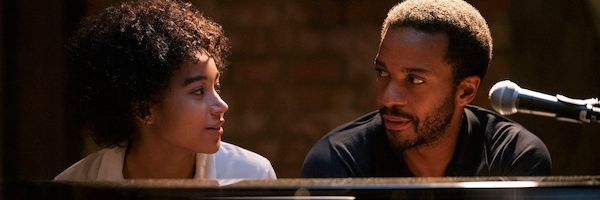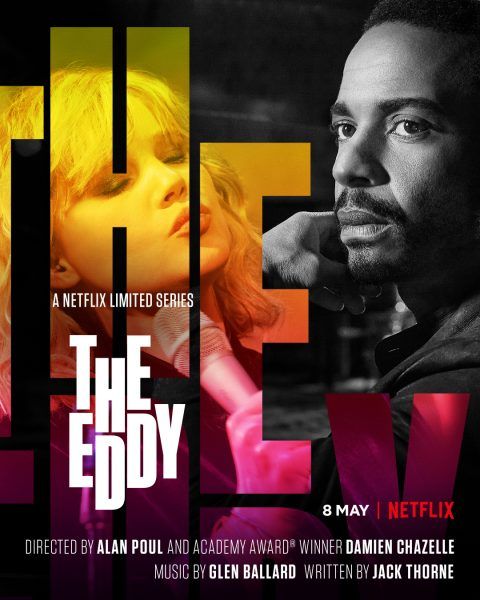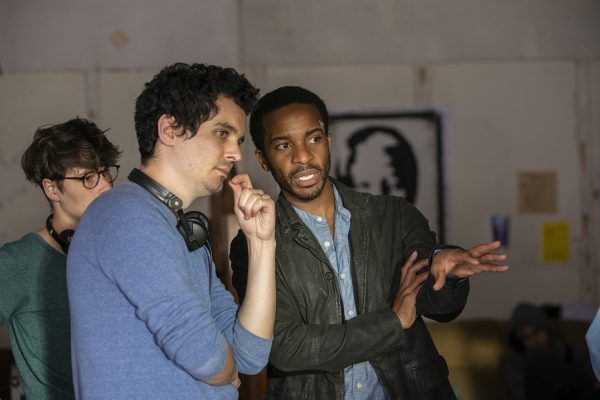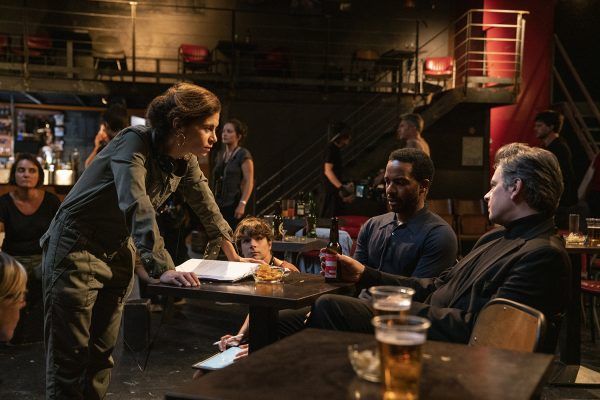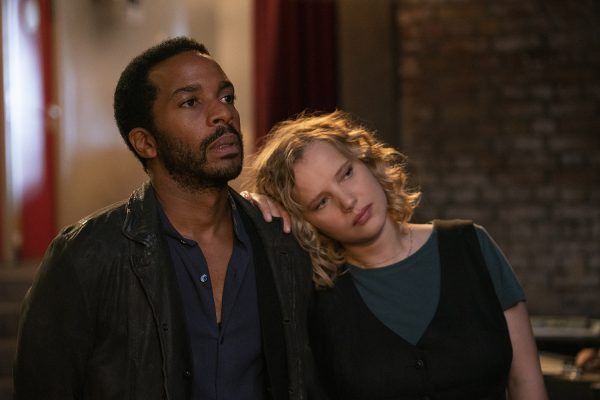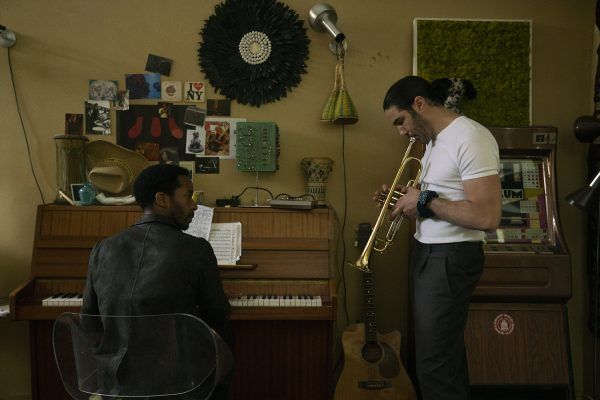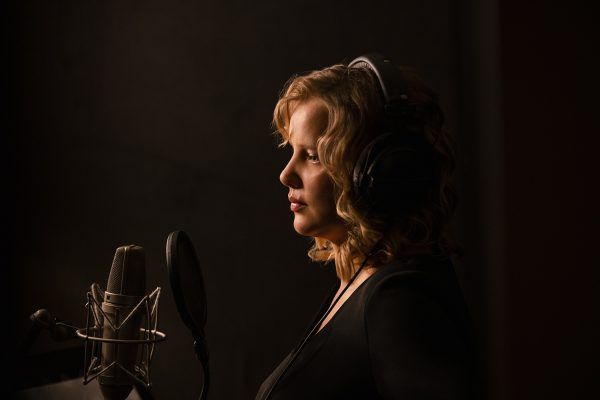Jack Thorne writes a lot. And I mean a lot. The guy has written on UK series as diverse as Skin, This Is England, and The Fades, co-wrote feature films like Wonder and The Aeronauts, and oh yeah, co-wrote the brand new Harry Potter play Harry Potter and the Cursed Child with J.K. Rowling. His talents seemingly known no genre limits, so it should come as little surprise that his Netflix series collaboration with Oscar-winning director Damien Chazelle The Eddy is as unique as it is ambitious. And boy is it ambitious.
The original TV series takes place in Paris and revolves around the goings-on at a jazz club run by an American named Elliott (André Holland), but as the series progresses it digs deep its ensemble cast. Each episode puts the focus on a different character, with Elliott remaining the constant, but the visual language of the show is… well, it’s like jazz. That was intentional, as Chazelle directed the first two episodes of the series and drew heavily from French New Wave cinema to create a language that is at once frenetic and poetic, resulting in a show that’s unlike anything else on Netflix right now. You can read Liz's in-depth review right here.
I recently got the chance to speak with Thorne about his work on The Eddy, as well as a few of his projects past and present. He explained how The Eddy actually predates Chazelle’s Oscar glory, as the show has been in the works for a long time. He discussed how they approached creating a show that would feel like jazz music, and whether they got any pushback from Netflix for making something so singular. Indeed, Thorne admits the show won’t be for everyone, but that was the goal—those who love The Eddy will really love The Eddy, because it’s a show so specifically for them. And yes, Thorne says they’ve already got ideas for a Season 2.
Thorne also talked about his experience collaborating with J.K. Rowling on Harry Potter and the Cursed Child and how he approached telling a story about an adult Harry Potter, and also talked about his work on a Sandman movie that never came to fruition and what to expect from the upcoming film Enola Holmes.
Check out the full interview below.
This was a big project when it was announced. I mean Damien was coming off the Oscar win for La La Land. How did the project kind of materialize for you?
JACK THORNE: You know what? It was way, way, way before that. If it'd been then, it would have been a very different thing, walking into that room I would have been very scared. Actually, it came about before even Whiplash came out.
Oh, wow.
THORNE: I was in LA doing a Writer's Room and my agent said, "There's a filmmaker of ours that we're really excited by. He's setting up a new TV project, we think you might be right for it." And I said, "Great." And they said, "We're going to send you over his film tonight. Watch it, and then you'll be inspired." The film they sent over was Whiplash.
My head was blown off in a thousand different directions. I thought it was extraordinary. I hoped the rest of the world would get it. They really, really did, and he became a superstar. That sort of happened while we were developing the show. I met him, frankly, before he had that great weight around his neck. Not that he ever carries a great weight around his neck, but I would have given him that necklace even if he hadn't been wearing it. Just kind of like you can't walk into a room with Steven Spielberg and be normal. I wouldn’t be able to walk into a room with Damien and be normal post-La La Land, but thankfully it was before that, so I was able to talk to him as a human being.
That's crazy. Well, so what were kind of those initial conversations like?
THORNE: Really fascinating, and the room was very, very intimidating. Don't get me wrong. You know, Glenn Ballard has made an awful lot of brilliant music, and Alan Poul has made some of my favorite TV of all time. It was always quite intimidating, but they were setting out to do a show about Paris, about American jazz in Paris, and Paris was a city that really, really fascinated me, particularly the suburbs of Paris really, really intrigued me. I've always been interested in cities and the way that cities work and Paris, because of that ring road, because it's got this big ring road running around the inner city, it has grown up as an incredibly exclusive place. I see New York going that way. I see London going that way and it felt like with this show we had an opportunity to talk about that and that's sort of where the conversation started. I showed them what I'd done on this other show, and they were intrigued enough by me to allow me to come on the journey with them.
That's awesome. When you guys were kind of developing the show, was it already set up at Netflix, or was this something that you guys developed into a pitch and then took that to Netflix?
THORNE: Yeah, no, we pitched it to Netflix and it was like two or three years before we did. It was a long process with a lot of twists and turns that happen on television journeys, which I won't go into.
Sure. Well, the reason I ask is because the show is kind of unlike a lot of the Netflix content that exists, which is why it kind of took me by surprise. I mean, it's handheld, it's gritty. A lot of it is in French. I mean, it's essentially a French New Wave TV series. Was there any pushback from Netflix on that?
THORNE: Well, we were Netflix Europe and so, no, not really. They knew what they were getting. We sold them the show and we were very clear that this wasn't going to be a show that's particularly binge-y. It wasn't going to be constructed that way. We were really interested in how to make a TV show feel like jazz. We wanted to play with rhythm. We waned to play with pace, and we wanted to be able to shift focus whilst hopefully keeping viewers engaged. The show that I kept talking about, although it has no relation to The Eddy whatsoever, was The Crown in that that is not a show that you kind of go “oh!” at the end of each episode, like is the Queen going to defuse the bomb and save the world. It's much more contemplative and it sits back on itself, and it's true to the palace, if you like. All we wanted to be was true to Paris and true to jazz in that same way.
That's interesting, and that makes a lot of sense, actually. Another one of my questions was how you hit upon the idea to center each episode around a specific character because The Crown also feels very... each episode feels individualistic. It feels like it's a complete piece each time out.
THORNE: Yeah, and that was the thing that we wanted to do. We wanted each episode to feel like a solo with Elliot as the rhythm section that drives you through it. We keep returning to Elliot's story, but we never let Elliot's story overwhelm the other story. You know, the crime element has to be there and has to be underneath because it was so important for his journey, but it should never overwhelm. We should never do lots of running down roads and car chases and all that sorts of things. It should be something that just kind of fits there, as crime does. You know what I mean? It's bewildering rather than driven.
Another thing that's really striking about the series is it's very naturalistic, and I was wondering kind of from your perspective, what was it like to kind of write very naturalistic dialogue? It feels like maybe some of the scenes may be a little bit improvised. Was that something that was kind of happening as the show was in production?
THORNE: Yes, very much so. That was the discussion that we had very early on. I worked in the UK a lot with Shane Meadows, and we've made four TV shows together, all of which are heavily written, and everything, every element is very thought about, but there's also space for the actors to be themselves within it. That felt very important to emulate, particularly if I'm working with non-actors, so that we make sure that their performances felt as truthful as possible, because sometimes the script can feel like a burden and it can sit heavily on a show, and we wanted the script to be there, to be present, but to also allow a lot of space for the actors to inhabit and be themselves within it. I bled over every word, but then allowed other people to bleed over it too, if that's not too disgusting a metaphor.
I know the show began before Damien Chazelle was quote unquote “Damien Chazelle,” but this was made with an Oscar-winning director at the helm. You're given a lot of creative freedom in terms of content, and I know you began your career in TV, but the world of television has changed so drastically. There is a cinematic quality to this show now. How did you find jumping back into television and this kind of streaming world where it does feel like everyone's off the leash and you can kind of do whatever you want?
THORNE: I mean, I think that's the thing that when you're writing a show for BBC One at 8:00, then you have a responsibility to try and be inclusive and you have a responsibility to try and keep people on the sofas, you know, the people that just turn on to the show because it's on BBC One at 8:00. With Netflix, this isn't going to be a show for everyone, really. It's going to be a show that's divisive. It's going to be a show that some people find boring and other people are compelled by, and you get the opportunity to be specific. That's what we wanted. We wanted some people to really love the show, and that's the show we tried to make.
It doesn't have the responsibility as a tentpole, like make sure the critics love it, it doesn't have the responsibility of a BBC One TV show where you want all the audience to sit with it. It's something where you want people to go, “You have to see this show. You'll get this show.” You know what I mean? Tell their friends. That is very exciting I think, as makers to be given that opportunity.
I love how it just really stands out from a bunch of the other stuff that is on Netflix right now. I think that just makes it more special, that it's able to be unique. Is there a possibility of like a second season or was this kind of envisioned as like a limited series? Have you guys talked about a season two?
THORNE: We have ideas. We're sort of relaxed about it. It depends on everything being right and us having a good enough idea to take us forward, that and Netflix wanting it. They took a big risk on us, and we'll see whether the risk paid off and if it did, then probably we would find other ways to tell stories about these characters. I still have a lot that I want to write about Julie and write about Elliot and write about Maja. I would be excited to do more, but I'm not like... it's not like one of those shows where you're kind of like checking the numbers daily in order to make sure that you might have the opportunity to do another one. You're not sweating over it. You're sort of just kind of being quite hopeful but but laid back. Or, try to be. I don't think I've ever been laid back in my life, by the way. I don't think I've got laid back in my soul, but I'm trying to be, trying to be (laughs).
I mean you're so prolific. I'm kind of in awe by your resume and everything that you've done, and I am a massive Harry Potter fan, so I have to ask what it was like getting a phone call about helping to create and write a brand new Harry Potter story with J.K. Rowling.
THORNE: I was walking down the pavement, actually, it was John Tiffany and I had made a show called Let the Right One In based on the film and the book of Let the Right One In. We were on the way to an award show for that play, and he said, "I had a phone call the other day about doing Harry Potter the play." And I was like, "That's amazing. You've got to do that." Honestly, the next question didn't occur to me. I didn't think I was the sort of person that would be given that sort of opportunity, but I understood why John was. John was a good hire for them. I was of a weird hire for them and, and then his next question was, "I really want you to write it. Would you consider it?" I literally fell off the pavement. I fell off the pavement as we were walking along into quite heavy traffic because I was so shocked by the idea.
Then, it sort of all rolled from there. The great thing about about making stuff, whether it's making it with Damien Chazelle or JK Rowling or whoever these intimidating people are, is that because there's a momentum, you sort of don't have the too much sort of smelling salts time. You don't have too much sort of like I'm in a room with JK Rowling. You're sort of going, “I'm in a room with JK Rowling for five hours. I need to use it in order to get all the information I need to be able to write the next bit that I'm trying to write, and so I will ignore the fact that she is the most glorious person in the world and just try and be her colleague for a little bit of time.” It was brilliant and so much fun and scary as hell.
How did that process kind of unfold? Was the story kind of there from JK Rowling? Did you guys kind of try alternate paths? I mean it's interesting, because you're sitting there, like you're playing with live ammo essentially, because there is this established franchise, and whatever you write will be canon, so that must have been nerve wracking.
THORNE: Yeah. The one advantage I have was that Harry was much older. He'd been given the opportunity to grow up. But the challenge I had was that everyone had their version of what old Harry would be, and so I was sort of fighting against that all the way. The two things that were most important to me were that this be a show about the damage that had been done to him, because it felt like I was Harry's age, and it felt like that that pain of being reflective and trying to be strong and trying to be a good dad—I was in the process of trying to be a dad at the time—brings up a lot of pain from your past, and him looking at that pain felt really important.
Then, the other thing was that I, and Jo was totally on board with this right from the get go, was that this be a show about kids that don't have a very good time at Hogwarts. I hated school. I didn't ever find a way of of fitting in with other children. It felt like that was something that the Harry Potter books hadn't had much opportunity to explore, and it could be interesting to explore that, that alienation, and that could be a useful addition to the canon.
There was no story. There were lots of ideas for stories, and so we all worked together on the story, and then I wrote various different outlines, and then eventually we found one that would work for us. During the outlining process, I was writing lots and lots and lots of seeds just so that Jo could read someone else writing Harry's dialogue, because I was really scared about that moment when suddenly it was like, “And now this is what Harry says,” and she would be like, “Harry does not say that.” (laughs)
I sort of snuck in a lot of dialogues through the back door, and my document's getting longer and longer and longer, I think it was 70, 80 pages by the end, that I was able to sort of shortcut my way into a story rather than having to sort of present something and go and “Voila!” Yeah, that was the process, and she was the most incredible collaborator through the whole thing and is undoubtedly the kindest person in the world. She's wonderful.
That's fantastic. You hear all these stories from the cast of the Fantastic Beast movies of talking to Jo, and she just has in her head all the answers to all of these backstories of characters and stuff that have never been revealed. Was it kind of exciting for you to get to kind of be around that and hear stuff that has not been written or made public?
THORNE: Yeah, and to hear all the making of and how the whole thing came together and what was there and what wasn't there, and what her process was. I mean that opportunity, and I've had it with Phillip Pullman [on His Dark Materials] too of picking up a writer and sort of shaking them to see what bits fall out is, you know, it's the best bit about my job by a long way.
Another project of yours that I know you were working on was a Sandman adaptation. How far did you get on that?
THORNE: I wrote two drafts, I think, of a film with David S. Goyer and with Joseph Gordon-Levitt, and it was really nice. It was a really nice process. It just didn't end up with a script that Warners thought was going to be commercially viable, and now I think they've arrived at a really good way of telling the Sandman story. You know, it's hard when you're being asked what's at threat, and you're saying dreams, for people to really sort of be able to engage with that. But you have to be true to that idea.
It taught me a lot about what you fight for and where you're prepared to walk away. When you finally go, “I can't fix this in the way you need it to be fixed, and I completely understand why you need it to be that, but just we will never be able to satisfy that urge for you.” They’re such beautiful, beautiful, beautiful books, and I now know Neil [Gaiman] quite well, and that's been a really glorious thing too that's come out of that.
That's really nice. I am very much looking forward to Enola Holmes. I think that that sounds like a really neat idea, and obviously Sherlock Holmes has been mined a number of different ways and has also been made incredibly popular by Moffat and Gatiss and that team. What can you kind of tease about this kind of twist on the story?
THORNE: It’s hard to know what I’m allowed to say (laughs). The thing I loved about what Nancy [Springer] wrote was that it was sort of... I'm going to use a very British word, and the British word that can sort of be misappropriated—there’s a naughtiness to it. There's a sort of like fun, there's a sort of playfulness with the whole detective genre, and there's a playfulness with where Sherlock came from and giving a reflection on that in a completely new way. Millie [Bobby Brown] is amazing. What Harry and her, Harry Bradbeer, who directed it and who is an extraordinary talent, what those two cooked up together is absolutely brilliant.
The supporting characters are supporting actors of your dreams, to have Helena Bonham Carter playing Enola's mom, Eudoria, was phenomenal. It's just all across the board. I don't like the word naughty, but it breaks rules, and I'm really proud of the film, and I hope people get it, but let's see.
I'm excited about that one. Before I let you go, I did want to tell you, I was lucky enough to see Radioactive at TIFF and I'm just a really big fan of that movie. I thought it was just such a smart way of telling that story, and I'm excited for people to see that one as well.
THORNE: Oh, thank you. Thank you. That was Marjane [Satrapi]. Marjane's, she's amazing and all the good bits of that are down to her. I can take very little credit for that film.
The Eddy is now streaming on Netflix.

